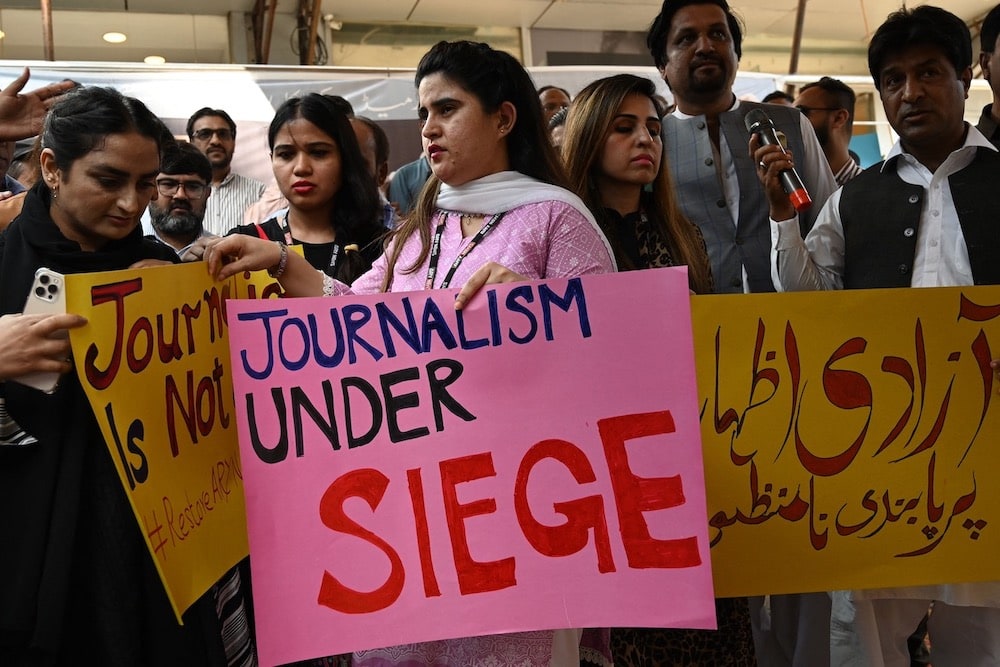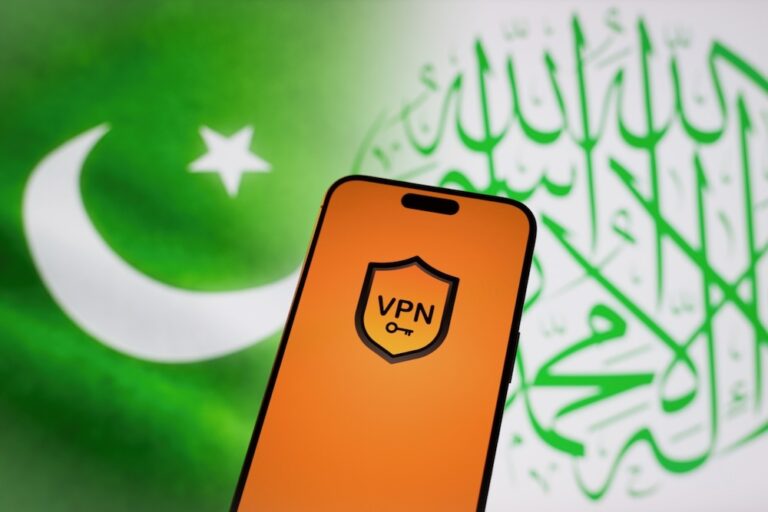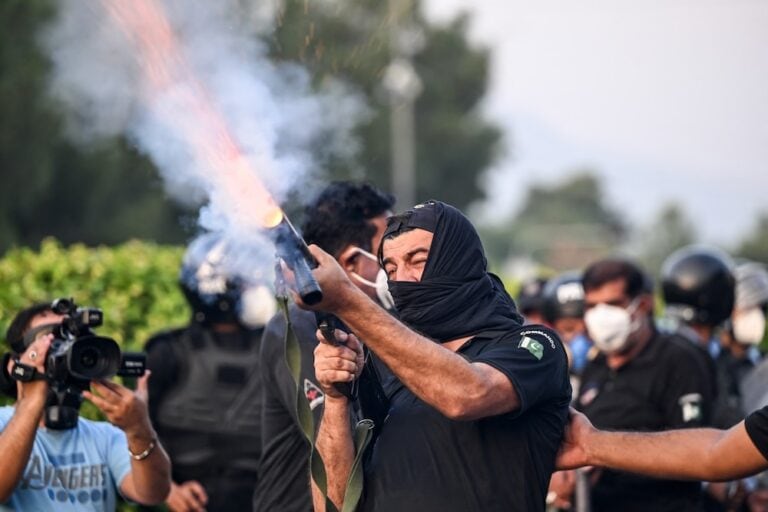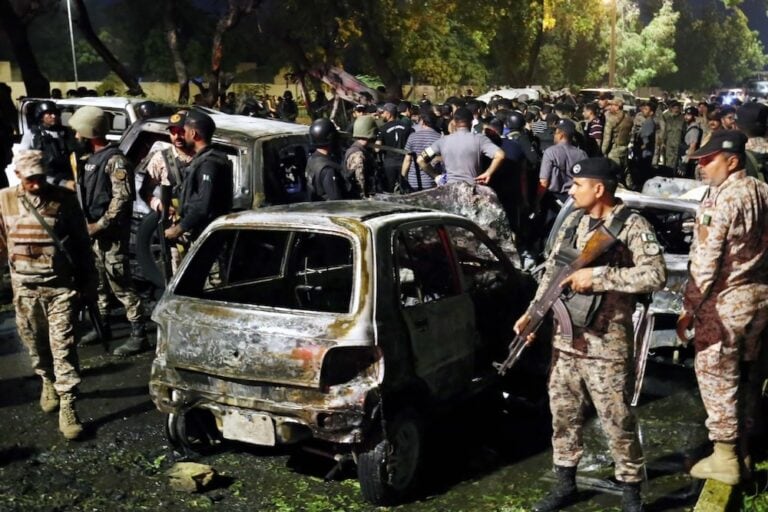Pakistan Press Foundation has documented at least 157 media-related attacks, including 16 instances of arrests, five instances of detention, and 44 cases of assault this year.
This statement was originally published on pakistanpressfoundation.org on 1 November 2023.
With Pakistan expected to hold general elections in January 2024, the need for an open, restriction-free, and safe environment for the media to work in is crucial. Journalists and media professionals in Pakistan must be able to cover the upcoming elections, including the pre-election period, without the fear of backlash in the form of violence or threats, the imposition of state-mandated restrictions, or legal measures to restrict free speech or target journalists.
As the world observes International Day to End Impunity from Crimes Against Journalists with a focus on the violence against journalists, the integrity of elections, and the role of public leadership, the Pakistan Press Foundation (PPF) draws attention to the situation for journalists and media practitioners working in Pakistan.
An election year brings a flurry of political activity, including rallies. The role of the media at such a time to ensure accurate, balanced, and timely coverage is vital. PPF reiterates the need for an accessible and safe environment for journalists.
In the lead-up to general elections, a period of political uncertainty and political transition, violence, intimidation, and the placing of restrictions are of grave concern.
The Election Commission of Pakistan has issued codes of conduct for the general elections.
According to the ECP Code of Conduct for Political Parties, Contesting Candidates, Election Agents, and Polling Agents, they must “firmly restrain” their workers from “exerting undue pressure” against print and electronic media, including newspapers’ offices and printing presses or “resorting to violence of any kind against the media.”
The ECP also issued a Code of Conduct for the National Media, which states: “The government and law enforcing agencies shall provide protection to media persons and media houses to maintain their freedom of expression.”
The code of conduct should assign direct responsibility to the different government bodies and law enforcement agencies to ensure that the safety of the media and their freedom of expression is maintained by referencing concrete measures to be taken to ensure this.
This year, the media in Pakistan has continued to face instances of physical violence and threats and works within a restrictive media landscape that has created barriers to their ability to cover critical developments in the country freely.
Meanwhile, perpetrators of violence against the media continue to enjoy impunity. According to the recently released Committee to Protect Journalists’ 2023 Global Impunity Index, which tracks impunity in the murder of journalists, Pakistan is ranked eleventh worst in the index. Reflective of the high prevalence of impunity, Pakistan has been a part of the index for 16 years, i.e., every year since the index was launched.
The impunity in the murder and killing of journalists also reflects the broader culture of impunity surrounding crimes against journalists. If those who kill media professionals are not held accountable, those who perpetrate other forms of violence and issue threats to media professionals are unlikely to face any consequences.
Between January and September 2023, PPF has documented at least 157 attacks on the media in connection with their work, including 16 instances of arrests and five instances of detention, 44 cases of assault, two cases of damage to property, four instances of raids, 18 instances of registration of cases against media professionals and two instances of legal action, 26 instances of censorship, 20 instances of harassment of journalists or media practitioners, 13 cases of threats, seven confirmed cases of kidnappings and three unconfirmed cases.
In May 2023, following the arrest of former Prime Minister Imran Khan, a flurry of activity, including violence against the media, registration of cases, abduction of journalists, and other steps were documented.
Multiple incidents of violence and raids against media professionals and case registration, arrests, and disappearances of media workers were documented nationwide.
Amongst the violence, on May 10, the building of the state-owned Radio Pakistan in Peshawar was attacked. The DSNG vans of Dawn News TV, Aaj News, Khyber News, and Express News were attacked in Peshawar. In Quetta, GNN News reporter Faizan Ali and cameraperson Shehbaz Ali, AFP reporter Banaras Khan, GTV News reporter Fateh Bugti, and daily Intekhab cameraperson Alexander Kalwin were manhandled by police covering the Pakistan Tehreek i Insaf (PTI) protests on May 9.
In Rawalpindi, Express News producer and social activist Syed Mustajab Hassan and Suno TV producer Muhammad Faizan Ashraf were manhandled by police when they started to make videos of police raiding the residence of PTI leader Raja Nasir Mehfooz on May 9.
In Islamabad, Voice of America correspondent Salman Idris Qazi was manhandled by police outside the Islamabad High Court.
In Punjab, a Geo News reporter, Dua Mirza, shared that police used tear gas to disperse protestors in Lahore on May 10. However, while no significant injuries were reported in the provinces, cases were registered against multiple journalists, raids were conducted on journalists’ homes, and some were arrested.
On May 19, the provincial home department announced the formation of the ‘Punjab Journalists Protection Coordination Committee’ that would intervene whenever a journalist is attacked in the province, facilitate investigations, and recommend necessary actions.
Various instances of journalists abducted or picked up were also documented.
On May 24, Bol News President Sami Abraham was picked up by 8-10 plainclothes, unidentified men in four cars in Islamabad. He returned six days later. Separately, on May 11, a YouTuber, Arqum Sheikh, was kidnapped outside his residence in Lahore. Sheikh had last reported on the events of May 9, after which he went missing. The whereabouts of Sheikh remain unknown.
Additionally, at least two journalists associated with the Jang/Geo group were “picked up” and returned safely a day later. On June 6, Geo News executive producer Zubair Anjum was picked up from his residence in Karachi. Just over a month later, on July 9, Daily Jang senior reporter Syed Muhammad Askari was picked up from the metropolis. He returned safely over 24 hours later.
On May 11, anchorperson Imran Riaz Khan was taken into custody at Sialkot Airport. The provincial inspector general of police had told the Lahore High Court in proceedings regarding Khan’s whereabouts that there was “no trace” of the anchorperson in any police department in Pakistan, Dawn reported. Riaz Khan’s whereabouts remained unknown for over four months when he returned.
On September 25, the Sialkot Police confirmed the release of the media person, stating that he had been “safely recovered” and was with his family.
Anchorperson Aftab Iqbal was also arrested on May 11 from his farmhouse in Lahore. Initially, his family had no idea about his whereabouts and shared that Iqbal had been arrested without warrants. It later came to light that Iqbal was arrested under Section 3 of the Maintenance of Public Order Ordinance (MPO).
Within a few days, cases were registered against at least five media professionals in June.
According to the criminal complaints registered against Shaheen Sehbai, Wajahat Saeed Khan, Moeed Pirzada, and Sabir Shakir, the complainants claimed that those participating in the violence on May 9, had taken instructions from the videos of the media professionals.
The criminal complaints against the media persons were registered under identical sections of the Pakistan Penal Code and the Anti-Terrorism Act. All four media professionals were outside the country when the First Information Reports (FIR) were registered against them.
Just days later, another case was registered against Bol News president Sami Abraham and Bol Newsowner Shoaib Sheikh on charges of “sedition, conspiracy, waging war, and terrorism,” Dawn reported.
In an unprecedented step, the Pakistan Telecommunications Authority (PTA) imposed a days-long block on mobile internet services and restricted access to social media websites. The blanket ban came into place on May 9, as protests broke out following the arrest of former premier Imran Khan. On May 12, mobile internet services were restored. Despite this, access to social media remained restricted till May 15, when it was fully restored.
The closure of mobile internet services and restricted access to social media created challenges for the media to report and disseminate information, affected the citizens’ ability to stay informed, particularly during significant political activity and uncertainty, and had an economic impact. According to Reuters, point of sales transactions fell by 50 percent, a day after the mobile internet services were suspended.
A similar internet closure was observed in January 2023, when the internet was shut down in the port city of Gwadar in Balochistan for ten days amidst clashes between protestors and police.
In June, in an interview with Geo News, the then Defence Minister Khwaja Asif said that social media should be regulated in Pakistan, adding that it was regulated in other parts of the world, such as Europe, China, and the United States, where it was monitored and had regulatory frameworks. He said that in Pakistan, social media was used to instigate people against the state.
According to an RTI request submitted by PPF, the PTA disclosed in June 2023 that it has currently blocked 10,675 websites — one due to anti-judiciary content, 315 due to anti-state content, 942 websites blocked in connection with blasphemy, 40 due to defamatory content or impersonation, 866 miscellaneous websites, 8484 proxy websites, and 27 websites in connection with sectarian content or hate speech.
The federal cabinet, now dissolved, had approved the Personal Data Bill, 2023, and E-Safety Bill, 2023. Rights groups criticized both bills.
In restrictions to broadcast media, among the directives issued in 2022-23 by the Pakistan Electronic Media Regulatory Authority (PEMRA) included a ban on airtime to “hate mongers” following the events of May 9, a ban on content regarding the conduct of sitting judges of the high court and Supreme Court, and a ban on covering terrorist attacks.
On the legislative front, on July 21, the National Assembly Standing Committee on Information and Broadcasting approved the Pakistan Electronic Media Regulatory Authority (Amendment) Bill, 2023. The bill proposed numerous additions, including a requirement for the timely payment of salaries to employees, the inclusion of two honorary members of the PFUJ as members of the Authority, the delegation of responsibilities to the chairman, member, or officer of PEMRA and the inclusion of protection against disinformation in the law.
The amendment bill added definitions for misinformation and disinformation, and under Section 20, broadcasters are now required not to air disinformation. The purpose of PEMRA was expanded to include “to enlarge the choice available to the people of Pakistan in the media for authentic news […]”.
While disinformation has posed a challenge for the media worldwide, the media must lead the method to control its spread. The media follows a code of ethics and must be permitted to self-regulate. By defining disinformation in the PEMRA amendment bill, there is room for the misuse of the law to label critical news as disinformation and suppress the broadcast media’s ability to report freely.
While the amendment bill had initially been withdrawn as announced by then Information Minister Marriyum Aurangzeb, on August 15, President Arif Alvi had signed it into law.
The role of the media in ensuring free and fair elections as a watchdog is integral to the democratic process. To ensure that the media is best able to cover the elections while ensuring the safety of journalists and media practitioners covering the general elections and events leading up to them while working without the fear of violence, threats, or restrictions, PPF recommends the following measures to be implemented or considered by the relevant authorities.
Recommendations:
- The federal-level Commission for the Protection of Journalists and Other Media Professionals must be established at the earliest. Despite the passage of the Protection of Journalists and Media Professionals Act 2021 in 2021, the Commission is yet to be formed.
- While the Sindh Commission for the Protection of Journalists and Other Media Practitioners (CJMP) was formed in November 2022, the email address for Commission members and the Commission website are yet to be created. These should be set up at the earliest to ensure that journalists are able to report cases of attacks to the Commission easily.
- The Sindh Commission for the Protection of Journalists and Other Media Practitioners was required to submit an annual report on the State of Safety and Security of Journalists to the government through the Information Department for submission to the provincial assembly. There is no update on the submission of a report for 2022 or any plans for a similar report being submitted for 2023. The Commission should provide details of such reports.
- The hastily passed Pakistan Electronic Media Regulatory Authority (Amendment) Bill, 2023, must not be misused and result in the policing of content by labeling critical news as disinformation. During times of increased political activity, such as elections, social media will also be increasingly active. It is the state’s responsibility to ensure that critical news is not branded as disinformation or used to censor journalists producing critical reporting.
- The caretaker government must ensure that Internet closures are not used to stifle free expression online in times of heightened political activity, political uncertainty, or instability. A statement by former Defence Minister Khwaja Asif left the door open for social media closures to be implemented again.
- Afghan journalists in Pakistan at the risk of deportation must be provided safe haven to stay in the country due to the risks that their return to Afghanistan may hold.
- As mandated by the federal and Sindh media safety laws, the relevant government (provincial or federal) should monitor the provision of mandatory training by media houses to staff.
- Along with the physical safety of journalists and media professionals, the digital safety of journalists and media professionals must also be ensured by the caretaker government.
- The Election Commission of Pakistan Code of Conduct for Political Parties, Contesting Candidates, Election Agents, and Polling Agents must be revised to ensure that journalists are protected from forms of cyber harassment and digital attacks at the hands of political party members and leaders.
- The Election Commission of Pakistan Code of Conduct for National Media should assign specific responsibilities and specifically focus on the safety of media professionals. While ensuring their freedom of expression is essential, it is a vague and overly generalized statement that is unlikely to translate to the actual safety of the media.
- The ECP Code of Conduct for National Media states that accredited media shall only be allowed to enter a polling station (along with camera) for making footage once. The ECP must clarify how media personnel can only be permitted entry once to a polling station on election day when they are covering multiple polling stations, reporting from various locations, and must be at multiple locations throughout the day.
- Each political party must develop a specific code of conduct for engaging with the media and ensure that this code of conduct is shared with party workers and members to ensure that the media do not face attacks or threats at the hands of political parties.



